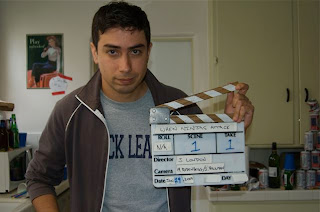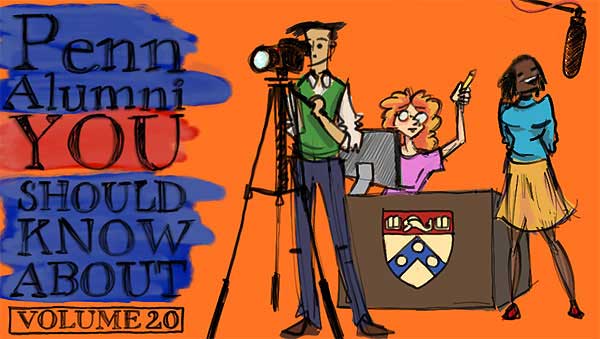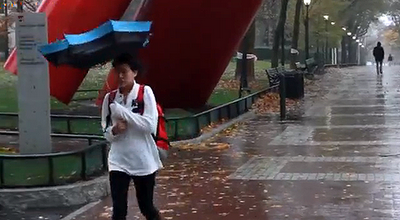Tuesday Tips: Advice for the Writer who Wants to Move Out to LA
 Penn writers Phyllis Zimbler Miller (WG’80), Eric Barker (C’94), Hadley Davis (C’93), Josh Heald (C’00)
Penn writers Phyllis Zimbler Miller (WG’80), Eric Barker (C’94), Hadley Davis (C’93), Josh Heald (C’00) In this week’s Tuesday Tips series, I have enlisted the help of my Penn alumni writer friends out here in Los Angeles to offer advice to the Penn undergrad or alum who has decided to move out to Los Angeles to pursue a writing career.
In this week’s Tuesday Tips series, I have enlisted the help of my Penn alumni writer friends out here in Los Angeles to offer advice to the Penn undergrad or alum who has decided to move out to Los Angeles to pursue a writing career.
Between the four of them (Phyllis Zimbler Miller (WG’80), Eric Barker (C’94), Hadley Davis (C’93), and Josh Heald (C’00)), they have written for books, TV and Film and have offered up some great advice to all of you including answers to the following questions:
-What classes should you take?
-Writing programs to use?
-Registering your work
-Events for networking
-Groups to join?
-Best place in LA to write?
-Any other advice?
I too have chimed in based on my years being a writer in Los Angeles and all the lessons I have learned.
Check out our advice below!
In addition to the actors who move out to Los Angeles, there’s also a new crop of Penn undergrads and alumni who move to Los Angeles to pursue writing. (see below)
Before I get to the panel, having been one of those “writers” (who is currently not pursuing it at the time – more about that below), I (Matt (C’96) have some useful advice for the writer pursuing a TV writing career in Los Angeles (especially in comedy):
Matt’s Advice:
1) What was my path …and why aren’t I writing now?
In Los Angeles, I started writing plays in a theater company and decided I wanted to start writing for TV. So I took some UCLA classes in TV Sitcom writing (mentioned below) and then got more serious and enrolled in Sheree Guitar’s writing class (also mentioned below)
In Sheree’s writing class, I met my writing partner and we had written 2 spec scripts for TV shows that were popular at the time (a Bernie Mac spec, Two and a Half Men). Our Bernie Mac spec won first place in a Los Angeles competition called the Scriptwriter’s Network. At that point Sheree began to represent us as our manager and we then wrote an original pilot that we then staged in front of a large audience. (We videotaped it and one day I hope to put it on this site!)
Because of that reading, we had some more meetings with agents and executives at various networks and even got invited into Fox’s “Naked TV” writer’s program. We pitched 5 ideas to a network executive, he liked 2 and we went with 1. We then wrote a 10 page script based on that concept. By that point my writing partner and I were experiencing some “growing pains” and it was becoming more and more difficult to write together (as we we were starting to argue more and more about different writing points too often). We agreed that if we didn’t get into the 2nd phase of Fox’s writing program that we would reconsider our writing relationship.
Turns out we didn’t get in… and then my writing partner and I decided to end our 2 year writing relationship. At that point I was reconsidering the whole sitcom genre and also felt the need to get my own writing voice back (your voice tends to merge with your writing partner’s after spending 2 years together). So I took a break. It’s been about 2 years now and writing has taken a back burner to some of my more exciting web projects (including this one!) that I’ve been developing. So regarding my future in TV/Film writing, we’ll see what happens..
2) What classes should you take?
Two classes I highly recommend are:
———————
a) Ellen Sandler’s class (former writer of Everybody Loves Raymond).
I took Ellen’s 10 week UCLA extension class. Having enrolled in her class, she has a real nice structured approach to understanding how to write for sitcoms. I’m not certain if she still teaches at UCLA extension, but you can check here: [url=http://www.uclaextension.edu/]http://www.uclaextension.edu/[/url] (I know she does private mentoring too). I recommend her especially for the beginner.
Check out her book:
The TV Writer’s Workbook: A Creative Approach To Television Scripts
More info about Ellen here:
http://www.sandlerink.com/
b) Sheree Guitar’s class
I had been a writer in Sheree’s class for 2 years and it was fantastic. This class is especially great for someone who has something already written. Sheree wrote for Roseanne and a number of other TV shows and currently has a bunch of projects set up as a writer as well as a manager. (If you ever saw Penn alum Myle Berkowitz’s 20 Dates, Sheree appeared in it!)
From the sitcom class (which meets every Saturday at a Los Angeles restaurant from 11 am until 5 pmish), I wrote a number of spec scripts (for Bernie Mac, Two and a Half Men, an Everybody Loves Raymond and a couple of original pilots).
Sheree sets the class up where there are about 10-15 writers who bring their sitcom specs or pilots in. Those scripts are then read by a group of actors who come in. During the first 1-2 hours, everyone listens to the words read aloud and takes notes about story and lines that could be “punched up” (made funnier). Then after all the scripts are read, there’s a short break, the actors leave and then all the writers re-convene and talk about each script’s story and then proceeds to help “punch-up” the script. The great part of this class is that it functions like a real TV writer’s room. For me it was fun to try to figure out how to weave a story together. (FYI, I took the sitcom class with another Penn alum ….Lisa Jones)
For the one hour and film writer, Sheree also offers a Monday night class that is similar to the process mentioned above.
You can contact Sheree at sguitar130@aol.com (be sure to tell her I referred you)
———————
3) Writing programs to use?
I used Final Draft and thought it was great. Definitely a great investment for the writer.
 Final Draft 7 Professional Scriptwriting Win/Mac
Final Draft 7 Professional Scriptwriting Win/Mac
Another useful investment is Robert McKee’s “Story”. A great book which shows you how to structure your stories by using examples.
 Story: Substance, Structure, Style and The Principles of Screenwriting
Story: Substance, Structure, Style and The Principles of Screenwriting
4) Registering your work
You can upload your work to the WGA and protect your work. Definitely a good idea if you start to send your work out for review. [url=http://www.wga.org]www.wga.org[/url]
5) Events to go to network
The Writer’s Guild has some great events to go to. I recommend going so you can listen to other’s stories on how they broke into the business and network with other writers to see what sorts of advice they have.
[url=http://www.wga.org/subpage_newsevents.aspx?id=902]http://www.wga.org/subpage_newsevents.aspx?id=902[/url]
Every September, a week before the Emmys, I typically go to listen to the Emmy award nominated writers.
Another great series of writer related events happens at Paleyfest at the Paley Center for Media
[url=http://www.paleycenter.org/festivals/paleyfest2008/index.htm]http://www.paleycenter.org/festivals/paleyfest2008/index.htm[/url]
(they’ve got the writers and stars of many of your favorite tv shows come to speak)
6) Best place in LA to write?
If you’re a coffee house writer, like I used to be you look for places that stay open late. I used to go to Insomnia Café on Beverly. Of course there is your typical Starbucks and Coffee Bean.
7) Any other advice?
The biggest advice I have for the writer is that it boils down to your work and dedication. They say writing is rewriting and in most writer’s experiences, this is true. It takes focus, dedication and a strong will.
I personally recommend the classes I mentioned above because I got to hear my work read and critiqued. As a writer you should be open to feedback. Most of my learning came from all the workshopping I have received on my scripts as well as the critiques I’ve made on others’ scripts.
[color=red]…Now that I poured out all my advice, I also wanted to open it up to a panel of current Penn writer friends of mine out here in Los Angeles.
Check out what they have to say and feel free to add your own suggestions![/color]
Eric Barker (C’94)
Credits:
- Developed a sequel to “Aladdin”, the $500M+ grossing animated film, for Disney in 2004.
- Sold option for feature film “Pet Store” to 20th Century Fox in 2003.
- Sold pitch for animated film “Get Lost” to Sony Pictures/Revolution Studios in 2000. Developed and wrote the screenplay for Revolution founder (and former Chairman of Walt Disney Pictures) Joe Roth.
- Wrote “The Clubhouse” in 1999-2000 for Seven Seas Productions
- Wrote “The Base” a $5M independent feature film released in 1998.
- Wrote and sold “Hitman’s Run” a $5M independent film released in 1998.
Multimedia and Creative Consulting
- Consulted with Oscar-winning CG team of “Lord of the Rings 2” in New Zealand in 2002.
- Developed and wrote “Backstreet Project” a series of “webisodes” featuring the Backstreet Boys for “Spider-Man” creator Stan Lee in 2000.
- Video game writing for “World of Warcraft” designer Rob Pardo in 1997.
1) What classes should you take?
-I highly recommend the Robert McKee seminar. Past that I think writing classes are good for one thing and one thing only: if you don’t have the discipline to write and will only do it when someone gives you a deadline. If you DO have the discipline then smart friends and blind coverage are all you need and classes are largely a waste. (Now, of course, I’m assuming you know all your basics, read TONS of books on the subject and have broken down plenty of movies.)
2) Writing programs to use?
-I’m skeptical of writing software. Final Draft worked fine for me but anything past that starts to get into “toy” territory. I don’t need my script read to me in 7 different voices. It’s what you put on the page that’s important, not the software. I’m not saying it can’t help, but I think people put undue focus on it.
3) Registering your work
-Register your work with the WGA. Copyright the first draft (with the actual government copyright form.)
4) Events to go to network
-Your best networking tool is a good script. Write one and everyone will want to meet you.
5) Groups to join?
-The best group to join is the one that consists of you in your apartment, chained to the desk until you get another draft out. Too many people do too much BS-ing with other writers and not enough time writing.
6) Best place in LA to write?
-Best place in LA to write is in your apartment, chained to the desk until you get another draft out. And, no, you cannot watch TV until your homework is done, kiddo.
7) Any other advice?
-There’s a ton of more specific advice I could give but the basics are out there for everyone to see and most people ignore those so I’m not going to pile more on. Learn the fundamentals and follow them unless you have a damn good reason not to. Past that the most ignored piece of talent is “the talent of the chair.” Put your ass in that chair and do the work. Once you have an idea that objective third parties agree is great and you have a solid structure, sit down and DO THE WORK. Don’t worry about software and groups and places and classes and networking — worry about writing stuff worth reading. First things first.
Hope this helps,
-Eric
Hadley Davis (C’93)
Credits:
1) What classes should you take?
Enroll in Writer’s Boot Camp in Santa Monica. They are great!
Phyllis Zimbler Miller (WG’80)
Credits:
- Mrs. Lieutenant: A Sharon Gold Novel(to be released in March 2008)
- Co-author of Jewish holiday book Seasons for Celebration
- Currently writing teen success guide Flipping Burgers and Beyond
- Lt. Commander Mollie Sanders (screenplay) — was a quarterfinalist in the Nichols one year
1) What classes should you take?
Writers Program at UCLA Extension has terrific classes in screenwriting, fiction writing, playwriting with terrific instructors. Very valuable. And often you can form a writing group out of writers you meet in class.
2) Registering your work
Register scripts with the Writers Guild. When I first registered scripts I went in person and waited for my turn. Now it’s easy at [url=http://www.wga.org]www.wga.org[/url].
Also the web has made a tremendous difference in getting info about upcoming events. Get friends to forward any of the writing-related info or networking info they get.
3) Final advice
Meet people and tell them what you’re doing. You never know who knows who. And again, the internet can now make a difference with Facebook, etc. And help others without expecting a quid pro quo. Again, you never know when someone will help you.
Oh, yes, one more thing. Ask Penn alums for help. Not everyone says yes, but it’s amazing how many Penn alums are willing to give a little advice to other Penn alums.
There’s a new website that offers “coverage” and “notes” for scripts. The definition of these two services is on the website at [url=http://www.dialoguedriven.biz]www.dialoguedriven.biz[/url].
Credits:
Film credits:
- Writer, “Mardi Gras” (Sony Screen Gems) – currently scheduled to begin shooting in New Orleans starting mid-June 2008
- Writer, “All You Can Eat” (New Line) – spec sale
- Writer, “Open Bar” (New Line) – pitch sale
TV
- Pilot development deals with Fox 21 (2004-8), with an original half-hour comedy pilot set up at Fox network during Fall ’07.
1) What classes should you take?
As far as what classes to take, there wasn’t much that Penn offered during the time I was there that I would say was tremendously valuable. It’s a good idea to read a lot of books on screenwriting, but nothing can replace the experience of reading a ton of scripts, be they produced or not — I’d recommend reading north of 50. I read somewhere in the neighborhood of 1300-1700 screenplays as a story analyst when I first moved to LA (way too many – I got burned out). At some point, the structural element to writing becomes rote and it’s easy to then concentrate on character and story.
2) Writing programs to use?
Final Draft. It’s the industry standard and there’s deep discounts for students.
3) Registering your work
When I first started writing, I was eager to register everything with the WGA, afraid that the big bad wolf was gonna eat it. When it comes down to it, you get more legal protection down the road if you just send yourself and registered mail copy of your script and don’t open it up. It’s known as the poor man’s copyright. WGA protection is extremely limited. Also, no legitimate studio is going to steal your work. It’s bad for business. Be wary of smaller outfits, I suppose? Ultimately, it is a good idea to have some paper trail on hand, just in case of the unlikely.
4) Events to go to network
Meet speakers on campus. When I was there, Kevin Smith, Conan O’Brien and others came to speak. Pester them for their email addresses or better yet, pester their assistants. There’s always someone looking to get ahead in the industry and if an assistant can show their boss that they’ve got a great script from a new contact, it can be mutually beneficial. The lower on the totem the contact, the hungrier and more available the contact is to be of sufficient help.
5) Groups to join?
Los Angeles Whiskey Society. It takes away the pain. 🙂 Really, I don’t know. Writing is kind of a solitary affair. You eventually meet other writers and directors when you venture outside into the harsh sunlight to get a muffin.
6) Best place in LA to write?
Different strokes for different folks. I’m not a coffee house writer. Those people annoy me. I love coffee, but I hate my own kind, I guess. I like to either write at home, or better yet, someone else’s home. Someplace without a lot of distractions and a poor internet connection.
7) Any other advice?
Patience and good self-analysis will carry you forward. When I first moved here, I think I expected to sell a script in 6 months. That naiveté did help me stay positive, but it can also get demoralizing. You have to be constantly looking at your situation every 3 months and asking yourself if you are significantly better off or farther along toward reaching your career goals than you were 3 months earlier. It’s an investment in your future. You have to have some sort of backup plan waiting in the wings (you went to Penn, after all — that degree is a heck of a good backup plan). I had to dig a hole and hope that my talents would be sufficient to get me out before it got too deep. My backup plan was going back to consulting — I almost got to that point (three months before selling my first screenplay, I was interviewing with Boston Consulting Group).
You have to not only be honest with yourself, but be honest with your family and friends, as well. There’s a lot of bullshit that goes on in Hollywood and you can’t be part of it. I never told anyone I was a writer before I actually sold something. It took me two and a half years of saying “I’m an aspiring writer” or “I’m trying to be a writer,” before I made that transition. Staying humble and being honest kept me on my path. It’s a good idea to get a job as a story analyst or a part time assistant. It’s a tough decision, because on one hand you want to be available and have the energy to write all day long, but on the other, it’s good to network and it’s even better to get a paycheck and health coverage. Just be persistent and take advantage of your free time. And eat lots of banana nut muffins and the occasional pastrami sandwich. It’s good writer fuel.
Credits:
Web Series:
- When Ninja’s Attack
- Singledom
1) What classes should you take?
Is Lapadula still teaching screenwriting at Penn? Is there anything else offered? Take a lot of film theory and history. Whatever gets you watching a wide range of films and storytelling.
2) Writing programs to use?
My Final Draft is wigging out so I’m currently using Celtx. It’s a free program from Celtx.com and I actually really like it because it segues into production really easily.
3) Registering your work
The WGA website.
4) Events to go to network
I barely leave my home office. It’s pretty sad. Facebook is my networking tool of choice. It’s sad, but makes it really easy to send out samples of my work through links.
5) Groups to join?
Writers groups with writers who will bring new pages in every week.
6) Best place in LA to write?
In my office with my dogs snoring on the couch behind me. If I need a break I’ll walk to the Target in Culver City and walk through the toy aisles.
7) Any other advice?
Read, write and watch everything critically. Pick up a camera, shoot some scenes, take your stories apart and put them back together. Directing and editing have helped my writing more than sitting down and pushing out pages with no end goal in sight. Producers also appreciate that you’ve thought about the story from a practical point of view and a mind of getting the film accomplished affordably.
8) May Alumni contact you?
Sure. jonathan at jonathanlondon.com
Related Posts

Elizabeth Banks tells Leno about strippers at Tri-Delt

From her tongue kissing boyfriend to her idiot brother: Liz Banks’ new roles

This Comedienne is Telling Us the 20 Best Secrets of Buying and Selling Homes (TV CLIP)

DT’s B&P: Alumni Dealings with Quentin Tarantino, Russell Crow and John Legend

Penn Alumni You Should Know About Vol. 21

DT B&P: Hollywood Comes to Penn This Weekend + More!










